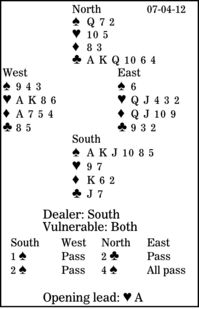Bridge column, July 4: When honors touch, tell partner

To be successful on defense at the bridge table, you have to be selfish, to analyze. Then, though, be unselfish by thinking about partner. Stay in touch with his problems and try to help him.
In this example, South is in four spades. West leads the heart ace. How should East analyze the deal, and what should he do?
South's two-spade rebid shows a minimum opening, 12 to 14 points, and at least a six-card suit.
From the dummy, it should be obvious to West that his side needs to take four red-suit tricks. East will think similarly, except that his partner might have a trump trick.
Then East needs to help his partner by dropping the heart queen at trick one. This shows the queen and the jack. (It cannot be a singleton queen, because then South would have six hearts and would have rebid two hearts.) It suggests to West that he might like to underlead his heart king at trick two. Perhaps East can do something from his side of the table -- attack diamonds successfully -- that West cannot do himself.
As you can see, this is the only way to defeat four spades.
The rule is that when you cannot win the trick because either someone has already played a higher card in the suit led than your best or you are discarding, play the top of touching honors (if you can afford to do so, of course).
** ** **
COPYRIGHT: 2012, UNITED FEATURE SYNDICATE
DISTRIBUTED BY UNIVERSAL UCLICK FOR UFS

